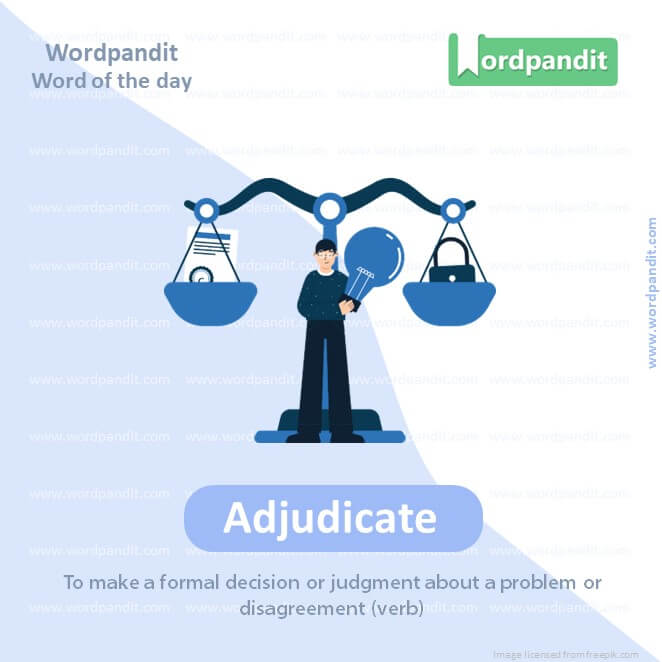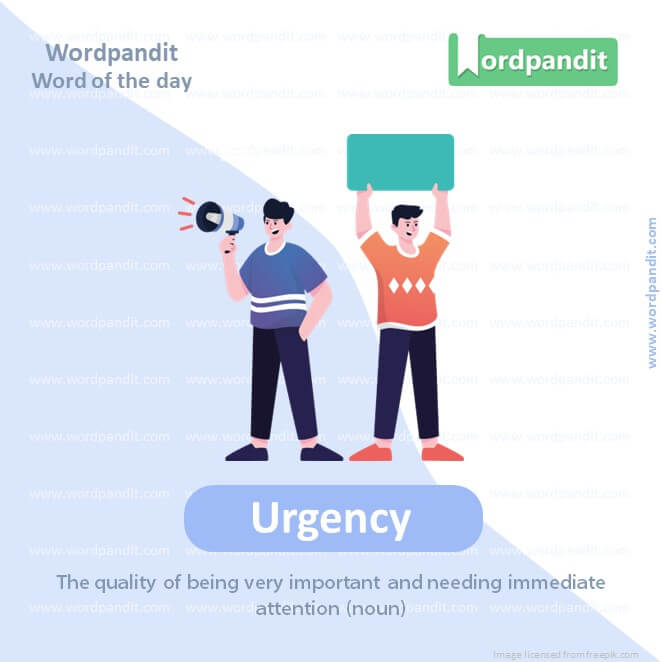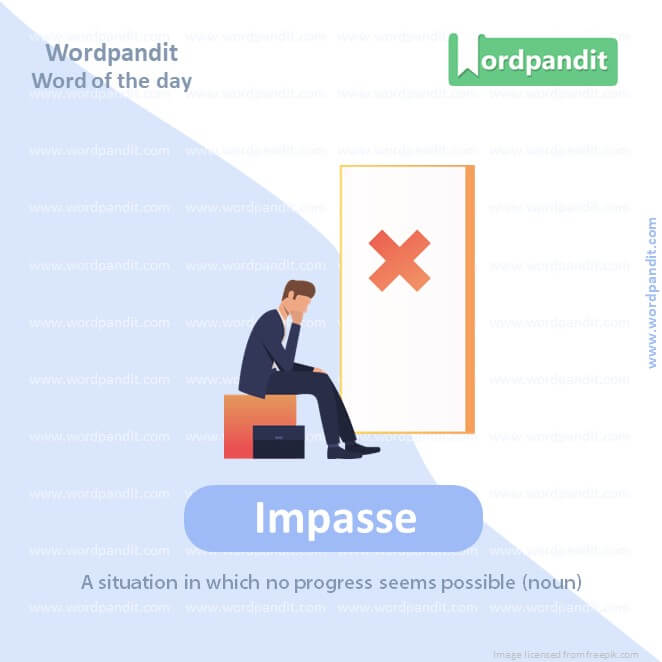Daily Vocabulary Words: List of Daily Used Words
Hi there. Welcome to this special section @ Wordpandit.
Our endeavour here is straightforward: highlighting important daily vocabulary words, you would encounter in The Hindu. This is your repository of commonly used words; essentially, we are posting a list of daily used words. Hence, this has significant practical application as it teaches you words that are commonly used in a leading publication such as The Hindu.
Visit the website daily to learn words from The Hindu.

WORD-1: Adjudicate
CONTEXT: It is a welcome sign of judicial assertion that the Supreme Court of India has fixed a deadline for the Maharashtra Assembly Speaker to adjudicate on petitions seeking the disqualification of members
SOURCE: The Hindu
EXPLANATORY PARAGRAPH: Imagine you and your friend are trying to decide who gets the last piece of cake. Instead of arguing, you both decide to ask someone else to make that decision. That person listens to both of you and then decides who gets the cake. When someone makes a decision like that, they are doing something called ‘adjudicating’.
MEANING: To make a formal decision or judgment about a problem or disagreement (verb).
PRONUNCIATION: uh-JOO-di-kate
SYNONYMS: Judge, decide, arbitrate, determine, resolve, rule on, settle.
USAGE EXAMPLES:
1. The board will adjudicate on the matter tomorrow.
2. He was asked to adjudicate the dispute between the two teams.
3. The court will adjudicate the case next month.
4. They chose a mediator to adjudicate their disagreement.

WORD-2: Alacrity
CONTEXT: Long experience shows that Speakers tend to treat disqualification issues with great alacrity or supine indifference, depending on their political affiliations.
SOURCE: The Hindu
EXPLANATORY PARAGRAPH: Imagine you are told that there’s ice cream in the kitchen. You’d probably run really fast to get it, right? That quick and happy readiness is called ‘alacrity’.
MEANING: Eager and enthusiastic willingness (noun).
PRONUNCIATION: uh-LAK-ri-tee
SYNONYMS: Eagerness, readiness, enthusiasm, willingness, zeal, keenness, avidity.
USAGE EXAMPLES:
1. She accepted the invitation with alacrity.
2. He completed the task with surprising alacrity.
3. They showed alacrity in offering help.
4. With alacrity, he raced to the store.

WORD-3: Urgency
CONTEXT: Despite being reminded from time to time of their duty to remain neutral and demonstrate a sense of urgency in dealing with questions arising out of the Tenth Schedule of the Constitution
SOURCE: The Hindu
EXPLANATORY PARAGRAPH: Imagine if your little toy is about to fall into a pond, you’d rush to grab it quickly, right? That feeling that something is really important and needs to be done now is called ‘urgency’.
MEANING: The quality of being very important and needing immediate attention (noun).
PRONUNCIATION: UR-jen-see
SYNONYMS: Importance, necessity, criticality, immediacy, pressure, haste, priority.
USAGE EXAMPLES:
1. The doctor emphasized the urgency of the situation.
2. There’s an urgency to fix the leak.
3. They discussed the matter with a sense of urgency.
4. The urgency in her voice was evident.

WORD-4: Steadfast
CONTEXT: we remain steadfast in our commitment to prioritising the health and safety of all our stakeholders.
SOURCE: The Hindu
EXPLANATORY PARAGRAPH: Imagine a big, strong tree that doesn’t move even when the wind blows hard. That tree is being ‘steadfast’ because it stays in one place and doesn’t change, no matter what.
MEANING: Firmly loyal or constant; unchanging (adjective).
PRONUNCIATION: STED-fast
SYNONYMS: Loyal, faithful, unwavering, resolute, unswerving, dependable, firm.
USAGE EXAMPLES:
1. She remained steadfast in her beliefs.
2. His steadfast support was invaluable.
3. The team was steadfast in their determination to win.
4. He gave her a steadfast look.

WORD-5: Impasse
CONTEXT: The Central government is likely to resolve its impasse with West Bengal over Mahatma Gandhi National Rural Employment Guarantee Act
SOURCE: The Hindu
EXPLANATORY PARAGRAPH: Imagine you’re playing a game and both teams are stuck because no one can move forward or win. That’s called an ‘impasse’, a situation where progress is impossible.
MEANING: A situation in which no progress seems possible (noun).
PRONUNCIATION: IM-pahs
SYNONYMS: Standstill, deadlock, stalemate, standoff, gridlock, bottleneck.
USAGE EXAMPLES:
1. The negotiation reached an impasse.
2. They were at an impasse, with neither side willing to compromise.
3. The committee is at an impasse over the budget.
4. The discussion hit an impasse and was postponed.
WORD-6: Incarcerated
CONTEXT: he had tried to influence prospective trial witnesses and needed to remain incarcerated.
SOURCE: The Hindu
EXPLANATORY PARAGRAPH: Sometimes, when people do something very wrong, they are put in a place called jail or prison to keep them away from others. When someone is put into jail, we can say they are ‘incarcerated’.
MEANING: Imprisoned or confined (verb).
PRONUNCIATION: in-KAR-suh-ray-ted
SYNONYMS: Imprisoned, jailed, confined, detained, locked up, interned.
USAGE EXAMPLES:
1. The thief was incarcerated for five years.
2. Many activists were incarcerated during the protests.
3. He was incarcerated on charges of fraud.
4. The conditions in which they were incarcerated were deplorable.
WORD-7: Speculative
CONTEXT: they made tens of millions of dollars in political contributions and charity donations and put millions of dollars more in speculative investments.
SOURCE: The Hindu
EXPLANATORY PARAGRAPH: Imagine if you’re guessing what gift you might get for your birthday. You don’t know for sure, but you’re making a guess. When we make guesses about things that we aren’t certain about, that’s called being ‘speculative’.
MEANING: Based on guessing or theory rather than certain knowledge (adjective).
PRONUNCIATION: spek-yuh-LAY-tiv
SYNONYMS: Conjectural, theoretical, hypothetical, suppositional, presumptive, assumptive, tentative.
USAGE EXAMPLES:
1. Her views on the topic are purely speculative.
2. He made a speculative investment in the new company.
3. The article was based on speculative theories.
4. Many speculative ideas were discussed at the meeting.
WORD-8: Volatile
CONTEXT: Discussed the importance of our two democracies cooperating closely in a volatile world
SOURCE: The Hindu
EXPLANATORY PARAGRAPH: Imagine a toy that can suddenly go from being calm and still to jumping and moving around quickly. That’s kind of what ‘volatile’ means. Something that can change very quickly and unexpectedly.
MEANING: Easily changeable and unpredictable (adjective).
PRONUNCIATION: VOL-uh-tyle
SYNONYMS: Unstable, erratic, unpredictable, fickle, explosive, changeable.
USAGE EXAMPLES:
1. The stock market can be very volatile.
2. He has a volatile temper.
3. The situation in the region is volatile.
4. The substance is volatile and can evaporate quickly.
WORD-9: Inadequacies
CONTEXT: The train accident in Vizianagaram district of Andhra Pradesh, which claimed 13 lives and left 38 injured, has again highlighted the inadequacies in the railway safety system.
SOURCE: The Hindu
EXPLANATORY PARAGRAPH: Imagine you have a tiny umbrella, and it’s raining heavily. That tiny umbrella isn’t enough to keep you dry. It’s not doing its job properly. Those things that aren’t good enough or don’t do their job properly can be called ‘inadequacies’.
MEANING: Things that are insufficient or not good enough (noun).
PRONUNCIATION: in-AD-e-kwuh-sees
SYNONYMS: Shortcomings, deficiencies, insufficiencies, flaws, weaknesses, lacks.
USAGE EXAMPLES:
1. The report highlighted the inadequacies in the current system.
2. She spoke about her own feelings of inadequacy.
3. The inadequacies of the plan were obvious.
4. They are trying to address the inadequacies in the healthcare system.
WORD-10: Reassure
CONTEXT: there was no proactive and intensive campaign by the government to reassure people that there would not be another such accident, one of India’s worst.
SOURCE: The Hindu
EXPLANATORY PARAGRAPH: If your friend is scared of the dark, and you tell them that everything is okay and there’s nothing to be afraid of, you’re trying to make them feel better and not scared. That’s what ‘reassure’ means to make someone feel calm and confident.
MEANING: To make someone feel calm and confident (verb).
PRONUNCIATION: ree-uh-SHOOR
SYNONYMS: Comfort, console, soothe, calm, encourage, pacify.
USAGE EXAMPLES:
1. He tried to reassure her that everything would be alright.
2. The manager reassured the team of his support.
3. She called to reassure her parents that she was safe.
4. The news did little to reassure the investors.
vocabulary learning app
Immersing oneself in a new language or enhancing one’s word pool in native tongue is a demanding undertaking. However, recent advancements in technology have provided an efficient solution to this endeavor: the vocabulary learning app. Embracing this digital tool can not only broaden your lexicon but also refine your language proficiency in an intriguing manner.
The crux of any vocabulary learning app lies in its ability to simplify complex language constructs and present them in an engaging and digestible format. Competitive apps offer features like flashcards, quizzes, and games that make learning less academic and more leisurely. Whether you’re a student struggling to learn English vocabulary or a language enthusiast eager to master Spanish, the vocabulary learning app serves as a robust platform to meet your linguistic goals.
Learning with a vocabulary learning app should be a systematic and consistent process. Starting with easy levels and gradually progressing to complex words allows for a steady language learning journey. Many learners make the mistake of rushing through levels which eventually results in an unclear understanding of words.
Interactivity defines the efficacy of any vocabulary learning app. Studies show that one learns faster and retains knowledge longer when they interact with the learning material. Therefore, effective use of the vocabulary learning app involves actively engaging with its various features – be it pronunciation guides, image associations, or sentence formulation exercises and repeating words or phrases until they resonate with you.
Another vital aspect of learning with a vocabulary learning app is consistent review and reinforcement. Periodic revision strengthens the neural connection, reinforcing the word memory in your mental database. Hence, make sure to set aside specific review periods within your app.
In summary, a vocabulary learning app shines in its capacity to make language learning engaging and accessible. But the value one derives from it essentially depends on how one uses it—gradual progression, active interaction, and consistent reviews form the pillars of a fruitful vocabulary learning exercise. This modern tool is an effervescent blend of convenience and comprehensiveness, making vocabulary expansion a delightful venture rather than a daunting task.













